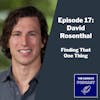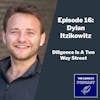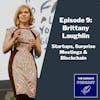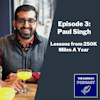Episode 1 - Relationships as a Superpower with Sree Kolli

Sree is the founder of Conduit, the VC dealflow marketplace that makes high quality introductions between investors and early stage founders. Prior to founding Conduit, Sree worked at JPM as a Tech, Telecommunications, and Media analyst as well as working as a VC associate at Partnership for New York. She is also the former head of Marketing & Community at AllRaise East, among others.
Key Takeaways:
If you’re looking to break into the Venture Capital industry, prepare for tons of tips. We discuss Sree’s career background and how she went about successfully positioning herself to be an attractive candidate for VC firms.
It’s On You to Build Your Case:
Some of the best advice we got was just how necessary it is for you to start doing the things that will make you successful in VC – and it starts with building relationships.
“I think what really made me interesting to venture funds was that I was also really involved in the ecosystem and building relationships. If I came across a company I was excited about; I’d reach out to folks at it.” – Sree Kolli
Hey! Thanks for downloading the first episode of the Going VC podcast. We're really excited to be bringing to you today our conversation with Sree Kolli. New episodes premiere every second Monday at 6 AM Eastern.
If you've got any questions, feedback, guest ideas, or just want to say hey, don't hesitate to shoot us a message at podcast@goingvc.com
Episode Segments:
Introduction
Sree’s Career Story - 02:12
Banking vs. Venture Capital - 07:03
Breaking into Venture Capital - 14:41
Founding Conduit - 25:39
Closing Thoughts - 33:32
The transcript has been edited and condensed for readability.
Sree’s Career Background
JJ (2:12): Thanks again for joining us, Sree! To get started, could you tell the audience about your background?
Sree (2:20): Sure! I spent about two years at the Partnership Fund for New York City, looking at mostly early-stage enterprise opportunities. Mostly life science, digital health, and FinTech. It was a great way for me to learn about how the venture ecosystem in New York works. The fund itself is interesting; it’s backed by many of the large corporations in New York: banks, other financial institutions, real estate companies/etc. Getting to see how those corporations interact with startups and watch New York evolve was really interesting. I’d always thought of the city as a financial hub, and seeing it from a healthcare/life-science lens was interesting.
Another exciting part of the role was getting to meet a ton of interesting people throughout the ecosystem. A lot of my time sourcing new opportunities and building relationships with other folks in the ecosystem; it was a great way to get my feet wet. Any of these two to three-year analyst/associate programs are a great way for junior investors to understand the ecosystem. That said, I also think it’s really valuable to get operational experience before committing for the long-haul. It helps you develop a rapport with founders, going through that process yourself.
JJ (4:12): Yeah! Before the Partnership Fund, you were at JP Morgan, right?
Yeah! I started my career in investment banking in the tech group at JP Morgan. After a few years there building out my understanding of the finance industry, I realized that I enjoyed working with early-stage companies, and there were a lot more opportunities to do that in venture. I started to think about how to get involved. What would be the best way for me to get broad exposure to different sectors and geographies? How could I figure out what I really liked and then dive deeper?
Austin (5:21): That’s awesome! Was there a genesis-moment where you realized you wanted to jump from working at a really large company like JPM to something much smaller like a venture fund?
Sree (5:33): There wasn’t one particular moment. Working in investment banking is a really great experience, especially right out of college. You get access to really sharp people and get to work on some of the world’s largest deals, which is phenomenal. There aren’t many other places where a 21-year old gets that sort of opportunity. It lays a solid foundation for whatever you do next.
At a certain point, though, things become a little repetitive. It’s really process-oriented, whereas I wanted to spend more time learning how key decisions are made and how early-stage companies create long-term value. The sort of insight you can only really get if you’re working closely with decision-makers at a company itself or an early-stage fund.
Banking vs. Venture Capital
JJ (7:03): Yeah! Was there anything at JPM that prepared you well to move to venture afterward? Could you expand a little on some of the differences between the two?
Sree (7:17): Culturally, it’s very different. Any financial services role is pretty institutionalized and has a lot of structure, which is great when you’re starting out. The skills I learned there enabled me to move over into the unstructured environment. They gave me the confidence and the ability to think beyond what already exists. I became a lot more execution-focused, more efficient, really analytical, and able to distill complex topics down into simple things. This, in turn, helped me build rapport with founders and other investors.
Relationships are also different. In banking, your relationships are pretty limited to the deals and companies you work with, but it’s a much broader, more collaborative ecosystem in venture. Many of the opportunities you end up pursuing come through your relationships, and building them are core to my ethos.
It’s really fulfilling. You get to meet and learn from so many incredible people from all walks of life. Moving into an unstructured role presented a lot more opportunities for growth. It’s more challenging and a little scary, but with that comes a lot of growth.
Austin (9:28): That’s awesome! Could you talk a little more about how you made that move? From banking to venture capital?
Sree (9:38): Sure! When you’re coming up on your two or three years in banking, a lot of folks wonder what they should do next. For me, the options I was considering were: private equity, joining a hedge fund, or exploring venture more thoughtfully. I wanted to optimize for learning/working with a different company stage than I had been working with at JP Morgan. I was enamored by venture; it was such an incredible opportunity to learn about so many different sectors and meet incredible people.
When most people leave banking, they typically go into private equity or join a hedge fund. A lot of that is simply that those institutions value the modeling skill-set you build-up in banking. When you look at an earlier stage fund, things become more qualitative, a lot less numbers-driven. Instead, it’s about the team, the TAM, the technology, and the traction; in that order. I came from a very structured financial services background, so I had the analytical skills, but I think what really made me interesting to venture funds was that I was also really involved in the ecosystem and building relationships. If I came across a company I was excited about; I’d reach out to folks at it.
I think it’s also crucial to develop a personal brand early-on. You need to be able to sell the fund’s vision and how they can support the founder. Showing that you can build strong, genuine relationships is so important, that you’re not just someone who sits there and crunches numbers all day.
Financial services are often thought of as a really transactional industry, and it can be, but I’ve come to realize that those sorts of relationships are ultimately unfruitful. Building real, genuine relationships with founders, future founders, experts, and other investors is just so much more impactful. Think about it this way, would you rather: spend hours reading up on a topic or be able to call up a friend and say: “hey, I know you’re an expert in this space, can we talk about it for 15 minutes?”. You’ll be able to have a much richer conversation with the founder afterward.
It’s a really organic thing, and at the beginning, it can be really hard. I started my recruiting process about 18-24 months before I was even thinking about leaving banking. For people who knew what they wanted to do in venture, it might take 4-6 months, but my process was a bit more nebulous. I wanted to learn a lot about the industry before I broke in. I tried to use that next 2-3 year stint to really integrate and immerse myself in the ecosystem and then figure out where I belonged.
Breaking into Venture
JJ (14:42): What do you think set you apart during that 18-month process?
Sree (14:46): Emotional intelligence, and being able to build great relationships with people are, I think, what helped me land the job. I understood how the broader ecosystem was interacting and how the different players worked together. I spent a lot of time building relationships before I was even interested in working with them.
It was a really organic thing. It’s impossible to cast a really wide net and be thoughtful in every interaction, but it’s also a small community, so you want to make sure you’re coming off in a very genuine way. Before meeting someone, I used to ask myself: what are their portfolio company’s, who are their founders, what sectors are they interested in, etc. Being able to add value to a conversation is just so critical.
The conversation should never be: “why should I hire you?”, instead it should be, “this is amazing, you’ve done so much for us already, we’d love to find a way to work together!”. That’s the golden statement you want people to say.
I think when I started recruiting, I didn’t have that. I was trying hard to figure out how to break-in, instead of thinking about how to create value and then positioning myself for the role I’d want.
The other thing you can’t forget is, people might be hiring for specific roles, but you can also create your own. It’s 2020; anything can happen. The key is figuring out what your strengths are. There’s no single formula for getting a role at XYZ fund. You’ve got to show your real personality and passion and then figure out how to create the position you want.
It might not turn out exactly how you imagined, but it’s crucial to have a broad picture and really optimize for learning over-optimizing for a logo on your resume.
JJ (17:50): Absolutely! That’s some of the best advice I’ve heard for people interested in venture. Don’t focus on a checklist of “good candidate” things, but instead on relationships, being helpful, and almost creating your own serendipity, because like you said, it’s 2020, and anything can happen.
Sree (18:04): Exactly! It was a great experience. I enjoyed that venture was less structured. Though, it did take some time to get used to. You’ve got to figure out how you want to spend your time. No one tells you: “these are the five companies, research them.” Instead, you’ve got to figure out the stakeholders, understand the state of the industry, and figure out where the valuable opportunities are.
JJ (18:52): Yeah! Definitely a lot more self-directed. How was that change?
Sree (18:57): I enjoyed it from a learning and professional development perspective. The learning curve was a bit steep from a cultural standpoint, though. It was a bit jarring going from strict schedules and working in a particular way to trying to think broadly, continually asking yourself: what am I trying to achieve, and what’s the best way to get there?
JJ (19:33): Were there any other significant changes?
Sree (19:36): It’s a very different mindset! Having a lot of hustle, being intellectually curious, and working hard are transferable and critical, but pushing yourself to think differently is also vital and outside of the scope of traditional banking. It’s something you develop over time. In general, people coming out of a startup are probably better suited for early-stage, whereas folks coming out of banking are likely better suited for growth equity unless you’re able to train your mind to be fungible about how you think about things.
JJ (20:29): Expanding on that last point, what advice would you give to someone with a similar background?
Sree (20:34): Diving deep into a specific area! Let’s say you’re interested in five different funds. Figure out what their mandates are, what their portfolio looks like right now, and what the gaps are. Then pick out some general trends to explore. For example:
If three of the funds you’re interested in are FinTech funds looking at payments, do a deeper dive into space, figure out the gaps, and what sorts of startups would be interesting. Then you can find opportunities and reach out and share your thoughts; I think it’s a great way to get in touch with folks.
You can also build your brand as a thought leader and create great content.
Another tangential thing you can do is reach out to a fund’s portfolio company and figure out some of their problem areas. From there, just help them as much as you can. Become a valuable resource and break in that way. I’ve seen a lot of people do that; it’s also a great way to build operational experience, which is so so valuable.
I didn’t quite realize it until I started working on a company myself. A lot of the suggestions you give as an investor aren’t necessarily practical on the execution front. It’s a sort of deep empathy you can only get if you’ve done it yourself or worked with someone who has closely.
Austin (22:39): Yeah! Could you expand on that operational experience point? I think many folks think that’s founding a startup, but what else could it be? How junior a role could you have and still develop that experience?
Sree (22:56): I think it’s less about the role and more the environment. If you’re a technical person, that could be, being an early engineering hire. Seeing how to go from idea to building something is incredibly valuable. It gives you empathy for technical founders; you realize how important those initial hires can be, among other things.
If you’re coming out of consulting or banking, working in sales/BD or operations is pretty helpful. Joining a company, wearing those multiple hats, and seeing how things evolve and scale over time. You get to see how the customer journey evolves, how sales and marketing teams work together, how the executive team thinks about a concept, takes something from idea to execution, as well as things like KPI management.
It’s all really helpful. It means that when founders ask, “how do I handle XYZ?” you can say, “In my prior role at ABC, we did this or this.” You also develop a lot more context, which is valuable. That said, I’d say it’s more about the stage and the type of roles versus the seniority. If you’re an early-stage hire, at the end of the day, your title might be one thing, but you’ll probably end up doing a bunch of different things! If you want to go to an early-stage venture fund, I’d join an early-stage company.
Founding Conduit
JJ (25:39): Makes sense! I’d love to switch gears to Conduit! Relationships, as you’ve mentioned, are an essential part of the industry. I’d love to hear more about Conduit, how it’s trying to help with that, and how it got started?
Sree (26:08): Sure! I met my co-founder, Edward Lando, through a mutual friend here in New York. He’s a very prolific angel investor. Both of us always had a strong passion for finding operators in the earliest days and connecting them with strategic capital. The venture ecosystem has become incredibly noisy and commoditized over the last five to ten years, and founders are eager to find folks that can add a lot of value beyond just a check.
What we’d noticed was that there’s often a trade-off between capital and expertise. Many of the larger funds don’t necessarily have the bandwidth to give early-stage founders the attention they need, and then on the other end of things, operator-angels don’t always have the check sizes that founders need. But there is a clear value proposition for connecting strategic capital to exciting opportunities all over the world, and that became our thesis.
There are a lot of platforms out there that run syndicates, but we think they’ve become pretty noisy. They’re optimized for breadth over quality. We wanted to, instead, build a marketplace with really high-quality talent on both sides.
JJ (27:59): Nice! How’s it been going so far?
Sree (28:01): Really well! It’s grown to over 1000 users in less than four months; we’re really excited about it. Our investors primarily fall into five different buckets:
- Exited founders
- Successful operators of large companies
- Family offices
- Strategic high net worth folks
- Traditional venture capital funds.
On the company side, it’s mostly pre-seed to Series A founders looking to raise somewhere between $500K to a few million. Founders that are looking for strategic folks to help them from an advisory perspective. About a third of the companies are in the enterprise space, a third are consumer-facing, and the rest are a mix of different things from logistics to security to FinTech. What’s been exciting for us is that a third of our users are overseas.
In a world where everything is remote, we think it’s compelling to connect people with opportunities in areas of the world that are less active. There are tremendous folks there, but they aren’t getting access to the same strategic angels or operator investors as founders in North America or Europe. It’s been a great way for us to capitalize on building a robust marketplace for startups and investors, and we’re excited about it.
JJ (29:44): That’s impressive, a third of your users being overseas, especially this early on! Could you talk a little more about how you’ve grown the marketplace?
Sree (30:00): Sure! Conduit has been entirely referral driven. We think that the product should speak for itself. We’ve tried to be thoughtful about how we’ve been connecting founders. My co-founder, Edward, has also invested in hundreds of startups, and those founders have also referred us to other folks as well.
We also spend a lot of time thinking about and researching different markets around the world. There are a lot of cities out there that are emerging startup nodes, and we’ve been laying the groundwork there, starting to build those relationships and be able to answer their concerns. I think it’s an incredible time to be building a product if you’ve got capital. If you don’t, it’s also an interesting time to be fundraising as you can get access to investors who might not previously of had the bandwidth to support you.
Austin (31:14): Curious to talk more about emerging markets. In the book Out-Innovate: How Global Entrepreneurs–from Delhi to Detroit–Are Rewriting the Rules of Silicon Valley by Alexandre Lazarow, he talks about how, in his view, Silicon Valley is over-saturated. Companies tend to build in existing markets, and there’s just so much opportunity in emerging markets. What’s your perspective on that? Do you see any advantages there?
Sree (31:46): I think at the end of the day, there are incredible founders and future founders all over the world. If you look at a few archetypes:
- People who’ve come out of large corporations and are now looking to take what they’ve learned and apply it elsewhere.
- Recent graduates with really strong academic experience
- Early-stage hires who’ve seen first-hand a company reach escape velocity and developed that unique skill set.
- People coming out of a more traditional sector, craving to start a business and immerse themselves in the ecosystem.
Those four categories of people exist all over the world. It’s compelling to us to be able to find them. Exploring those sorts of markets is an incredible way to learn about potential opportunities and find people who are experts in their area. A founder in the US looking to solve a problem in South America might be interesting. Still, I’d bet that someone in South America looking to solve that same problem will have a lot more local context and be able to create a more compelling company faster.
Closing Thoughts
JJ (33:30): 100%! I couldn’t agree more! Changing gears again, we’re getting towards the end of our time. Is there anything you want to leave the listeners with?
Sree (33:39): Yeah, definitely! At the end of the day, I think it’s important to remember that VC isn’t binary and that relationships compound over time. When you’re reaching out to folks and trying to find ways to collaborate in some capacity, you should always try to add value.

Sree Kolli
Founder at Conduit
Sree is the founder of Conduit, the VC dealflow marketplace that makes high quality introductions between investors and early stage founders. Prior to founding Conduit, Sree worked at JPM as a Tech, Telecommunications, and Media analyst as well as working as a VC associate at Partnership for New York. She is also the former head of Marketing & Community at AllRaise East, among others.
New to The GoingVC Podcast?
Here are some great episodes to start with. Or, check out episodes by topic.


































